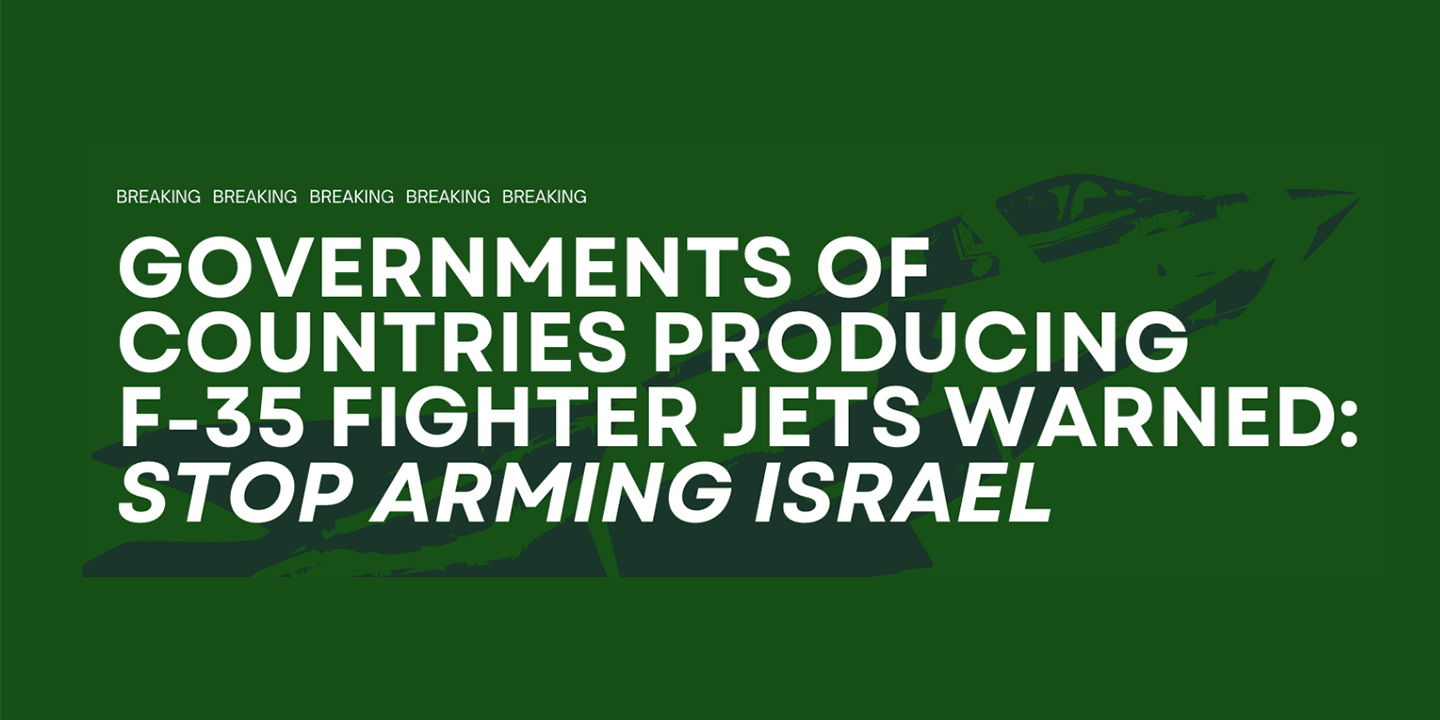

Joint global letter calling on the governments of F-35 programme partner countries to stop arming Israel
This letter has been sent to the relevant Government Ministers of F-35 programme partner nations, which include: Australia, Canada, Denmark, Italy, the Netherlands, Norway, UK and US.
We write to you as a group of organisations from partner countries to the global F-35 jet programme, and supportive organisations, calling on our Governments to immediately halt all arms transfers to Israel, directly and indirectly, including F-35 fighter jets, components, and spare parts thereof.
After 466 days of Israel’s military offensive in Gaza, we welcome the limited ceasefire which came into effect on 19 January, and call on our Governments to support every effort to permanently end the ongoing atrocities. The past 16 months have illustrated with devastating clarity that Israel is not committed to complying with international law. The fragility of the Gaza ceasefire underscores the risk of further violations and the need to halt arms exports to Israel, including F-35s. This is also highlighted by Israel’s continued illegal use of military fighter jets in the occupied West Bank, especially Jenin.
Partners to the F-35 programme have individually and collectively failed to prevent these jets from being used to commit serious violations of international law by Israel, most obviously across the occupied Palestinian territory, including international crimes, despite overwhelming evidence in this respect. States have either been unwilling to observe their international legal obligations and/or claimed that the structure of the F-35 programme means that it is not possible to apply arms controls to any end-user, making the entire programme incompatible with international law.
Israel’s unprecedented bombardment and destruction of Gaza has led to immeasurable human suffering, environmental devastation, and humanitarian catastrophe. The International Court of Justice (ICJ) ordered provisional measures on Israel to prevent genocide against the Palestinian people in Gaza in January 2024. In December 2024, Amnesty International’s investigation concluded that Israel has committed and is committing genocide against Palestinians in Gaza, and Human Rights Watch reported that ‘Israeli authorities are responsible for the crime against humanity of extermination and for acts of genocide’.
A temporary ceasefire does not signify an end to Israel’s violations of international law or nullify the longstanding risk that arms transfers to Israel might be used to commit or facilitate such violations. This includes, but is not limited to, Israel’s ongoing occupation and annexation of the Palestinian territories, which the International Court of Justice (ICJ) concluded is unlawful.
Israel has killed more than 46,707 people in Gaza and the remains of an estimated 10,000 more people are still under the rubble. At least 90 percent of Palestinians in Gaza have been forcibly displaced, in conditions unfit for human survival. Israeli forces have repeatedly attacked civilian objects, including aid distribution sites, tents, hospitals, schools and markets. Around 69 percent of all structures in Gaza have been destroyed or damaged by the bombardment. Despite these devastating realities and crimes on the ground, our governments have continued to supply Israel through the F-35 programme.
F-35 programme
Governments from a number of F-35 partner countries – namely Canada, Denmark, Italy, the Netherlands, and the UK – have restricted some arms exports to Israel due to the risk of these weapons being used by Israel to commit violations of international law in Gaza. In September 2024, the UK government found that it was “unable to conclude anything other than” that for certain UK arms exports to Israel, including F-35 jets, there is a clear risk that they might be used to commit or facilitate a serious violation of international humanitarian law in Gaza. Alarmingly, despite these irrefutable admissions, there has been a concerted effort to sustain the transfer of components to the F-35 programme, allowing for ongoing direct and indirect transfer to Israel.
A number of incoherent positions have been put forward by F-35 partner countries allowing for the continued export of F-35 parts and components to Israel, including stating that arms licences to Israel have been suspended while allowing transfers under existing licences or supplying “indirectly” via the US or other F-35 partners. The UK has argued that for reasons of international peace and security it has disregarded its own arms export licensing criteria and international legal obligations to continue exporting components to the F-35 programme, allowing for onward transfer to Israel, claiming that it is a “matter of such gravity that it would have overridden any […] further evidence of serious breaches of IHL”. Effectively, there are no circumstances in which this supply of F-35 components would be suspended.
These jets have been operating in Gaza armed with munitions, including 2,000 lb bombs – explosives with a lethal radius up to 365 m, an area the equivalent of 58 football pitches. In June 2024, a UN report identified these bombs as having been used in “emblematic” cases of indiscriminate and disproportionate attacks on Gaza that “led to high numbers of civilian fatalities and widespread destruction of civilian objects”.
On 2 September 2024, the very day the UK Government announced an exemption for F-35 components, Danish NGO Danwatch revealed that an F-35 was used in July to drop three 2,000 lb bombs in an attack on a so-called “safe zone” on Al-Mawasi in Khan Younis, killing 90 Palestinians. This bombardment follows the pattern of Israeli attacks in Gaza in violation of international humanitarian law.
Legal obligations and developments
All partners to the F-35 programme are States Parties to the Arms Trade Treaty (ATT), with the exception of the United States, which is a signatory. State Parties to the ATT are required to prevent both direct and indirect transfers of military equipment and technology, including parts and components, where there is an overriding risk that such equipment and technology could be used to commit or facilitate a serious violation of international humanitarian law (IHL) or international human rights law.
These and other binding obligations are contained within Articles 6 and 7 of the ATT. States are also bound by the obligation to ensure respect for IHL under Common Article 1 to the Geneva Convention and customary IHL, which requires states “to refrain from transferring weapons if there is an expectation, based on facts or knowledge of past patterns, that such weapons would be used to violate the Conventions”.
All F-35 partners have additional legislation reinforcing these international obligations at either national or European level. Continued arms transfers to the Israeli government are contrary to US law, which for example, prohibits the transfer of military aid to governments that restrict the delivery of US humanitarian assistance. Additionally, all F-35 partners have ratified or acceded to the Genocide Convention, and have committed to “prevent and punish” the crime of genocide.
These obligations are reinforced by pronouncements of the ICJ, including where the Court reminded States Parties to the Genocide Convention of their international obligations regarding the transfer of arms to parties to an armed conflict, to avoid the risk that such arms might be used to violate the Convention in April 2024 (para 24). In July 2024, the ICJ clarified that states must not aid or assist Israel in its unlawful occupation of occupied Palestinian territory, including through economic or trade dealings. The International Criminal Court (ICC) issued arrest warrants for Israeli Prime Minister Benjamin Netanyahu and former Minister of Defence Yoav Gallant for war crimes and crimes against humanity in November 2024.
Legal and political responses
Across the jurisdictions of F-35 partner countries legal and political interventions have sought to enforce governments’ national and international legal obligations to halt arms exports to Israel, including parts for the F-35 jets. Legal cases have been undertaken in Australia, Canada, Denmark, the Netherlands, the UK, and the US.
In the UK, Al-Haq and Global Legal Action Network are taking the UK government to the High Court in a Judicial Review challenging the decision to exclude components for the global F-35 programme from the September 2024 suspension of around 30 arms licences to Israel. In November 2024, the Dutch Supreme Court of the Netherlands was advised by its advocate general to uphold the ruling by the Hague Court of Appeal ordering the Dutch Government to block the export of F-35 parts from the Netherlands to Israel. It followed litigation brought by Oxfam Novib, PAX and The Rights Forum.
In Australia, Al Haq, Al Mezan Center for Human Rights and the Palestinian Centre for Human Rights, represented by the Australian Centre for International Justice, made submissions requesting the Defence Minister revoke all current or extant export permits to Israel including via this US. As a result, the Government undertook a review which revealed that Australia had ‘lapsed’ or ‘amended’ 16 export licences to Israel. The groups remain concerned that no transparency exists in relation to this review, including whether F-35 parts were in consideration. Further cases are ongoing in F-35 partner countries Canada and Denmark, as well as Germany and Belgium.
Conclusion
The failure by all F-35 partner nations to apply their domestic, regional or international legal obligations by halting the supply of F-35 parts and components to Israel has led to devastating and irreparable harm to Palestinians in Gaza. This failure indicates that partner nations are effectively either unable or unwilling to implement their purported arms export control regimes, or that they chose to apply the law selectively, excluding Palestinians from its protection. We call on all F-35 partners to do everything in their power to bring the F-35 programme in line with their legal obligations and immediately halt the direct and indirect transfer of F-35 parts and components to Israel.
Signatories
Australia (F-35 Programme Partner)
- Amnesty International Australia
- AusRelief
- Australian Centre for International Justice
- Australia Palestine Advocacy Network (APAN)
- Australian Social Workers for Palestine
- Canberra Palestine and Climate Justice
- Central West New South Wales for Palestine & We Vote for Palestine
- Coalition for Justice and Peace in Palestine
- Disrupt Wars
- Free Gaza Australia
- Free Palestine Melbourne
- Independent and Peaceful Australia Network (IPAN)
- Independent & Peaceful Australia Network (IPAN) Geelong & Vic Southwest
- Inner West for Palestine
- Institute of non-violence
- Jewish Council of Australia
- Jews Against the Occupation ’48
- Just Peace
- Knitting Nannas, Central Coast and Midcoast
- Medical Association for Prevention of War
- Mums for Palestine
- Neptune’s Pirates
- No Weapons for Genocide
- Northern Rivers Friends of Palestine
- Palestine Action Group Muloobinba
- Palestine Network Shining Waters Region (PalNet SW), The United Church of Canada
- People’s Climate Assembly
- Rising Tide
- Settlement Services Australia
- Social and Ecological Justice Commission (United Church of Canada)
- Sydney Peace Foundation
- Quakers Australia
- Wage Peace
Austria
- Yante – Youth, Art, and Levante
Belgium
- Al-Haq Europe
- Vredesactie
Canada (F-35 Programme Partner)
- Al Huda Institute Canada
- Amnesty International Canadian Section
- Arab Left Forum
- Bathurst Street United Church
- The Canadian BDS Coalition & International BDS Allies
- Canadian Foreign Policy Institute
- Canadian Lawyers for International Human Rights
- Canadian Muslim Healthcare Network
- Canadians for Justice and Peace in the Middle East
- Canadians for Justice and Peace in the Middle East Saskatoon Chapter (CJPME Sask chapter)
- Collectif de Québec pour la paix / Quebec City Collective for Peace
- Health Workers Alliance for Palestine
- Independent Jewish Voices Canada
- IslamicFamily
- Just Peace Advocates/Mouvement Pour Une Paix Juste
- Justice For All Canada
- Labour Against the Arms Trade
- Manitoba Healthcare Workers for Palestine
- Mennonite Church Manitoba Palestine Israel Network
- Ontario Palestinian Rights Association (OPRA)
- Oxfam-Québec
- Palestinian and Jewish Unity (PAJU)
- Project of Heart
- Project Ploughshares
- Solidarité Sherbrooke-Gaza
- RightonCanada
- United Network for Justice and Peace in Palestine and Israel (UNJPPI)
Denmark (F-35 Programme Partner)
- ActionAid Denmark
- Amnesty International Danmark
- Oxfam Denmark
France
- Amnesty International France
Italy (F-35 Programme Partner)
- Rete Italiana Pace e Disarmo
- Accademia Apuana della Pace
- Amnesty Internationl Italia
- ARCI-Italy
- Ass. Adl Zavidovici
- Associazione Percorsi di pace
- Associazioni Cristiane Lavoratori Italiani aps
- AssoPacePalestina
- Beati i costruttori di pace (Blessed Are the Peacemakers)
- Center for Research and Elaboration on Democracy (CRED)
- Centro Studi Sereno Regis
- CIPAX Centro interconfessionale per la pace
- Coordinamento Nazionale Comunità Accoglienti (CNCA)
- COSPE NGO
- Diritto Diretto
- Emmaus Italia
- Fondazione Finanza Etica
- Istituto di Ricerche Internazionali Archivio Disarmo
- MIR (Movimento internazionale della Riconciliazione)
- Movimento Nonviolento
- Scuola di Pace del Comune di Senigallia
- Un Ponte Per
India
- Gig Worker Association
Iraq
- Al-Taqwa Association for Women and Children’s Rights
Ireland
- Anti Racism World Cup
Jamaica
- Kingston and St Andrew Action Forum
Jordan
- Campaign Against Gaza Genocide
Lebanon
- Al-Jana Center
- KAFA (enough) Violence & Exploitation
- Permanent Peace Movement
- WILPF Lebanon
Morocco
- Association Mains Libres
México
- Centro de Estudios Ecuménicos
Nepal
- Path
- Women for Peace and Democracy Nepal (WPD Nepal)
The Netherlands (F-35 Programme Partner)
- Amnesty International Netherlands
- Feminists of Maastricht
- Oxfam Novib
- PAX
- The Rights Forum
- Stop Wapenhandel
- Transnational Institute
Norway (F-35 Programme Partner)
- Amnesty International Norway
- The Association of Norwegian NGOs for Palestine
- Changemaker
- Fagforbundet – Norwegian Union of Municipal and General Employees
- Jødiske Stemmer for Rettferdig Fred (Jewish Voices. – Norway)
- NTL OsloMet Metropolitan University (trade union)
- The Palestine Committee of Norway
- Palestinas Venner OsloMert
- Sosialistisk Venstreparti
Palestine
- Al-Haq
- Al Mezan Center for Human Rights
- International Committee to Support the Rights of the Palestinian People
- The Palestinian Initiative for the Promotion of Global Dialogue and Democracy-MIFTAH
- Palestinian Working Woman Society for Development PWWSD
Switzerland
- Control Arms
Sri Lanka
- Forum on Disarmament and Development
Turkiye
- Worldwide Lawyers Association
United Kingdom (F-35 Programme Partner)
- ActionAid UK
- Action For Humanity
- Action on Armed Violence
- Amnesty International UK
- Anglican Pacifist Fellowship
- Bahrain Institute for Rights and Democracy (BIRD)
- Bank Better
- Boycott Bloody Insurance
- British Arab Nursing and Midwifery Association
- British Palestinian Committee
- Cambridge Branch – Communist Party of Britain
- Cambridge Stop the War Coalition
- Cambridgeshire Keep Our NHS Public
- Campaign Against Arms Trade
- Campaign against Misrepresentation in Public Affairs, Information and the News (CAMPAIN)
- Campaign for Nuclear Disarmament
- Coal Action Network
- Common Wealth
- Conflict and Environment Observatory
- Council for Arab-British Understanding
- Cuba Solidarity Campaign
- Embrace the Middle East
- FairSquare
- ForcesWatch
- Gaza Genocide Emergency Committee (Glasgow)
- Glasgow Palestine Human Rights Campaign
- Global Justice Now
- Global Legal Action Network
- Health Workers 4 Palestine
- Independent Catholic News
- International Centre for Justice for Palestinians
- International Solidarity Movement Scotland
- The Iona Community
- Jewish Network for Palestine
- Merseyside Pax Christi
- National Justice and Peace Network, England and Wales
- Omega Research Foundation
- Palestine Action
- Palestine House
- Palestine Solidarity Campaign
- Pax Christi England and Wales
- The Peace and Justice Project
- Richmond & Kingston Palestine Solidarity Campaign
- Sabeel-Kairos UK
- Saferworld
- Scientists for Global Responsibility (SGR)
- Scotland Against Criminalising Communities
- Shadow World Investigations
- Thanet 4 Palestine
- Tipping Point UK
- United Tech and Allied Workers
- War on Want
- Women in Black Edinburgh
- Women in Black London
- Workers for a Free Palestine
United States (F-35 Programme Lead Partner)
- Action Corps
- American Friends Service Committee
- Amnesty International USA
- Art Forces
- Association for Investment in Popular Action Committees
- Austin For Palestine Coalition
- Center for Civilians in Conflict (CIVIC)
- Center for Constitutional Rights
- Doctors Against Genocide
- Episcopal Peace Fellowship Palestine Israel Network
- Fellowship of Reconciliation
- Friends of Sabeel North America (FOSNA)
- Global Centre for the Responsibility to Protect (GCR2P)
- Global Ministries of the Christian Church (Disciples of Christ) and United Church of Christ
- Green Mountain Solidarity With Palestine
- Green Mountain Veterans For Peace
- Honor the Earth
- Indiana Center for Middle East Peace
- KinderUSA
- Madison-Rafah Sister City Project
- The Middle East Children’s Alliance for Peace
- National Lawyers Guild- Palestine Sub Committee
- New Mexico Jews for a Free Palestine
- A New Policy
- Nonviolence International
- Palestine Justice Network of the Presbyterian Church (U.S.A.)
- Palestinian Youth Movement
- Peace Action
- People’s Arms Embargo
- RepresentUS New Mexico
- Safe Skies Clean Water Wisconsin
- Santa Fe Democratic Socialists of America
- Security in Context
- Showing Up for Racial Justice (SURJ) Northern New Mexico chapter
- Tech Justice Law Project
- USA Palestine Mental Health Network
- Vermont and New Hampshire Chapter of the National Lawyers Guild
- Will Miller Social Justice Lecture Series
- WESPAC Foundation, Inc.
International
- Al-Haq Europe
- Cairo Institute for Human Rights Studies
- Center for Civilians in Conflict (CIVIC)
- Emergent Justice Collective
- Human Rights Watch
- International Coalition to Stop Genocide in Palestine
- Oxfam International
- Pax Christi International
- United Methodists for Kairos Response (UMKR)
- War Resisters’ International
- Women’s International League for Peace and Freedom
- World BEYOND War
Related Content


Atrocity Alert No. 470: Haiti, Israel and the Occupied Palestinian Territory and Venezuela
